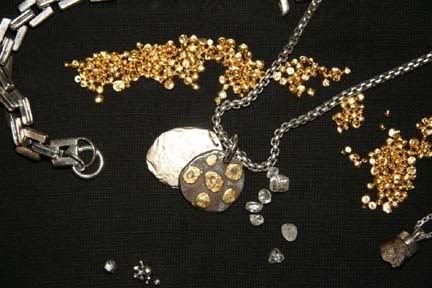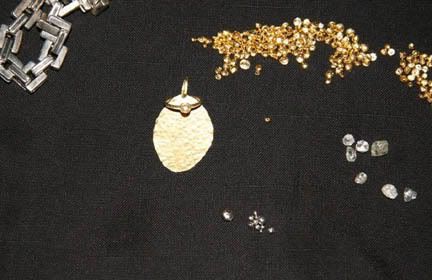A FairJewelry.Org exclusive: Wade Watson, On Rebuilding Sierra Leone.
Wade Watson, cofounder of Pride Diamonds writes about his Social Entrepreneurship to help rebuild Sierra Leon.
—————————
In early 2005, myself, together with Andrew Greenblatt, a social venture capitalist with a successful not-for-profit background co-founded, Pride Diamonds, a socially responsible, U.S.-based company that partners with local land owners and chiefdoms to small-scale, alluvial diamond mine in Sierra Leone’s rural countryside, and works to effect positive social change.
We are committed not only to best practices within the mining industry, but also to diverting a substantial portion of profits to building desperately needed infrastructure, like schools and hospitals, in the communities where we do business.
Pride Diamonds is a manifestation of a new class of business person. Intent on making profits, the social entrepreneur is equipped with the tools to improve the lives of millions of needy souls beyond the reach of traditional charities and ignored by corrupt political leaders. Sustainable jobs and infrastructure are what creates longstanding change. Business has always given back, but today’s for-profit philanthropists or, “social entrepreneurs” are writing their vision for social justice directly into their business plans.
Why give a charity fighting malaria in Africa a one-time, million-dollar donation, when that bonus of capitol would only provide temporary relief to a community’s suffering? Consider the social entrepreneur’s model: an investor takes that same million and invests it into a local company manufacturing cheap bug netting, growing and distributing plants that eradicate malaria and distributing affordable malaria medication. In addition to helping create a vibrant, profitable, and self-sustaining business, the investment will pay the priceless dividend of helping to protect the local population from malaria’s curse of fevers, anemia and death.
The challenge for the social entrepreneur is to find economic sectors riddled with social injustice and develop models that set about making a profit and a difference. The history of the diamond trade is full of tragedy, with those closest to the ground suffering the most.
In Sierra Leone, the diamond mining industry hired bandits in the 1950’s to rob, and if necessary kill, traders who were moving diamonds out of the country. By the late 1990’s “conflict or blood diamonds” were being smuggled out of Sierra Leone to support a band of terrorist rebels who routinely used rape, mutilation, and murder to control the same diamond fields.
Today, Sierra Leone is a democracy, it is safe to do business, its people are hard working family oriented and still has vast natural resources including rich surface level diamond deposits. However, due to its instability from the early 90’s to 2002, all foreign investment disappeared.
Starting last December, I have made two long trips to Sierra Leone working with the people. I have found Sierra Leonans to be hard working and some of the nicest people in the world. Yema Lyell is a forty-something business consultant who makes a living helping companies get through the ins and outs of getting started in her country. Buzzy Soya-Bongay, another forty-something professional, works as a logistics manager for an international construction company.

Initial samples made from Sierra Leone diamonds and artisan mined gold
Both escaped Sierra Leone with their lives as the rebel forces took over the capital in 1999. Both witnessed horrific human atrocities. Buzzy watched as the US Marines held a bridge with a helicopter for American embassy and ex-pat citizens to escape – wishing he carried a document that would allow him to go to the United States. Both have siblings or children living in the US. Both envision a democratic country open for foreign investment with infrastructure as experienced in the western world.
As the rebels were pushed out of Freetown, they enacted a horrific policy of scorch and burn. Therefore, any infrastructure, roads, bridges, government offices, power and rail lines were destroyed. What little advances his country had prior to the conflict began anew in 2002. There are no words or pictures that could possibly convey the level of poverty that exists in Sierra Leone. However, the citizens of Sierra Leone are ripe for partnerships with natural resources and a hard working business climate to bargain with.
Our goal is to turn handsome rewards for investors while helping alleviate the desperate poverty in Sierra Leone. In this needy corner of the world, tattered by civil conflict, where 70% live below the poverty line and the average life expectancy is a depressingly short 39. Sierra Leoneans routinely die from dysentery, malaria, typhoid and yellow fever.
Specifically, in the first five years of operations our business model is projecting profits before taxes of approximately $130 million while employing nearly 1000 people and re-investing over $40 million back into the country. We have been working with Tiffany in moving this project forward.

Additional samples made from Sierra Leone diamonds and artisan mined gold
These numbers illustrate how a relatively small investment today can be leveraged into both a high rate of return for the investor and pipe millions more in to a worthy cause. As the company becomes more profitable, the people of Sierra Leone are given greater resources in their struggle against poverty. We intend on helping these communities unlock the wealth beneath their feet and direct it towards sustainable economic growth.
If you are interested in learning more about my project or participating, please contact me at 917-913-7273 or
email me at [email protected]
Wade Watson
